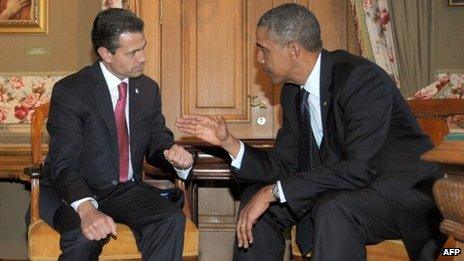Brazilian President Dilma Rousseff calls off US trip
- Published
Jay Carney: "The President agrees with this decision they made together to postpone the visit"
Brazilian President Dilma Rousseff has called off a state visit to Washington next month in a row over allegations of US espionage.
The US National Security Agency (NSA) has been accused of intercepting emails and messages from Ms Rousseff, her aides and state oil company, Petrobras.
The allegations were based on documents leaked by fugitive former intelligence contractor Edward Snowden.
President Barack Obama had promised to investigate the incident.
The White House said he had telephoned Ms Rousseff on Monday to discuss the matter.
The allegations of widespread espionage against Brazilian citizens were first published in July by Rio de Janeiro-based journalist Glenn Greenwald, a reporter for the British Guardian newspaper.
Mr Greenwald alleged that the NSA accessed all internet content that Ms Rousseff had visited online.
The documents, according to the report, were part of an NSA case study showing how data could be intelligently filtered.
Earlier this month, another report by Mr Greenwald on Globo Television alleged that the NSA had illegally accessed data from Petrobras.
The company is due next month to carry out an important auction for exploration rights of an oil field off the Rio de Janeiro state coast.
Ms Rousseff has said that if the accusations are proven it means the NSA was involved in "industrial espionage".
'Full investigation'
Ms Rousseff's state visit was to have started on 23 October and would have been the first by a Brazilian president since 1995.
But in a statement on Tuesday, the Brazilian government said that "given the proximity of the scheduled state visit to Washington - and in the absence of a timely investigation of the incident, with corresponding explanations and the commitment to cease the interception activities" it could not go ahead as planned.
The statement said Brazil hoped the visit would take place "as soon as possible", once the issue had been "resolved properly".
White House spokesman Jay Carney said the postponement had been a joint decision between Ms Rousseff and Mr Obama, who agreed it "should not be overshadowed by any bilateral issue".
The White House said in a statement: "The president has said that he understands and regrets the concerns [that] disclosures of alleged US intelligence activities have generated in Brazil and made clear that he is committed to working together with President Rousseff and her government in diplomatic channels to move beyond this issue as a source of tension in our bilateral relationship."

Mr Obama told Mexico's Enrique Pena Nieto he would take personal care of a probe into the allegations
The BBC's Wyre Davies, in Rio de Janeiro, says the decision to halt the trip will not have been easy as Dilma Rousseff is respected in Washington and was to have been the only world leader afforded the honour of a US state visit this year.
Turning that opportunity down, he says, will be interpreted in some diplomatic circles as a snub.
But our correspondent says that by standing up to unacceptable practices she may well have enhanced her own chances of re-election next year.
Snowden's flight
The NSA has been accused of looking into electronic communications from what the US sees as hostile Latin American governments, such as Venezuela and Ecuador, as well as traditional allies, including Mexico.
At the G20 meeting in Russia earlier this month, Mr Obama promised to investigate the allegations of espionage against Ms Rousseff and her Mexican counterpart, Enrique Pena Nieto.
"What I got from President Obama was a commitment to a full investigation... and if they turn out to be true to impose corresponding sanctions," Mr Pena Nieto told the BBC.
Edward Snowden, a former NSA contractor, began providing caches of sensitive government documents to media outlets four months ago.
In June, the 30-year-old fled his home in Hawaii, where he worked at a small NSA installation, to Hong Kong, and subsequently to Russia.
A US federal court has since filed espionage charges against Mr Snowden and is seeking his extradition.
Mr Snowden, however, remains in Russia where he has been granted temporary asylum.